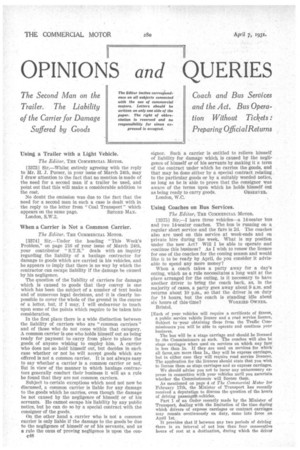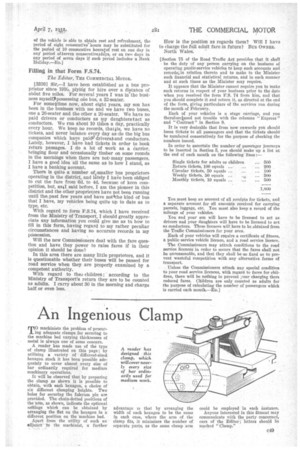OPINIONS and QUERIES
Page 86

Page 87

If you've noticed an error in this article please click here to report it so we can fix it.
Using a Trailer with a Light Vehicle.
The Editor, THE COMMERCIAL MOTOR.
133731 Sir,—Whilst entirely agreeing with the reply to Mr. II. J. Purser, in your issue of March 24th, may draw attention to the fact that no mention is made of the need for a second man if a trailer be used, and point out that this will make a considerable addition to the cost.
No doubt the omission was due to the fact that the need for a second man in such a ease is dealt with in the reply to the letter from "Coal Transport" which appears on the same page. SECOND MAN. London, S.W.2.
When a Carrier is Not a Common Carrier.
The Editor, TEE COMMERCIAL MOTOR.
[3374] Sir,—Under the heading "This Week's Problem," on page 216 of your issue of March 24th, your contributor " S.T.R." deals with an inquiry regarding the liability of a haulage contractor for damage to goods which are carried in his vehicles, and he appears to imply that there is no way by which the contractor can escape liability if the damage be caused by his negligence.
The question of the liability of carriers for damage which is caused to goods that they convey is one which has been the subject of a number of text books and of numerous legal decisions, and it is clearly impossible to cover the whole of the ground in the course of a letter, but, if I may, I will endeavour to touch upon some of the points which require to be taken into consideration.
In the first place there is a wide distinction betweenthe liability of carriers who are "common carriers and of those who do not come within that category. A common carrier Is one who holds himself out as being ready for payment to carry from place to place the goods of anyone wishing to employ him. A carrier who does not so hold himself out, hut decides in each case whether or not he will accept goods which are offered is not a common carrier. It is not always easy to say whether a carrier is a common carrier or not, ffut in view of the manner in which haulage contractors generally conduct their business it will as a rule be found. that they are not common carriers.
Subject to certain exceptions which need not now be discussed, a common carrier is liable for any damage to the goods which he carries, even though the damage be not caused by the negligence of himself or of his servants. He cannot escape his liability by any public notice, but he can do so by a special contract with the consignor at the goods.
On the other hand a carrier who is not a common carrier is only liable if the damage to the goods be due to the negligence of himself or of his servants, and as a rule the onus of proving negligence is upon the eon
4248 signor. Such a carrier is entitled to relieve himself of liability for damage which is caused by the negligence of himself or of his servants by making it a term of the contract under which he carries the goods, and that may be done either by a special contract relating to the particular goods or by a suitably worded notice, so long as he is able to prove that the consignor was aware of the terms upon which he holds himself out as being ready to carry goods. OBSERVER. London, W.C.
Using Coaches on Bus Services.
The Editor, THE COMMERCIAL MOTOR.
133751 Sir,—I have three vehicles—a 14-seater bus and two 14-seater coaches. The bus is running on a regular short service and the fare is 2d. The coaches also are used on this service at week-ends and on private hire during the week. What is my position under the new Act? Will I be able to operate and continue this business?' As I wish to renew the licence for one of the coaches for the coming season and would like it to be ready by April, do you consider it advisable to spend any more money?
When a coach takes a party away for a day's outing, which as a rule necessitates a long wait at the place arranged for the outing, is it necessary to have another driver to bring the coach back, as, in the majority of cases, a party goes away about 9 a.m. and returns about 10 p.m., so that the driver is on duty for 14 hours, but the coach is standing idle about six hours of this time? WORRIED OWNER. Bristol.
[Each of your vehicles will require a certificate of fitness, a public service vehicle licence and a road service licence. Subject to your obtaining these from the Traffic Commissioners you will be able to operate and continue your business.
The bus will he a stage carriage and should be licensed by the Commissioners as such. The coaches will also be stage carriages when used on services on which any fare is less than 1s. If they are used on services for which all fares,are more than 1s., they will be express carriages, but in either case they will require road service licences. The application for the licences should state that you wish to license them as stage carriages and as express carriages.
We should advise you not to incur any unnecessary expense in connection with your vehicles until you ascertain whether the Commissioners will license them.
As mentioned on page 4 of The Commercial Motor for February 17th, the Minister of Transport has recently received a deputation to discuss the question of the hours of driving passenger. vehicles. Part 1 of an Order recently made by the Minister of Transport, dealin,s,, with the limitation of the time daring which drivers of express carriages or contract carriages may remain continuously on duty, came into force on April 1st.
It provides that if between any two periods of driving there is an interval of not less than four consecutive hours of rest at a destination, during which the driver
of the vehicle is able to obtain rest and refreshment, the period of eight consecutive hours may be substituted for the period of 10 consecutive hourspf rest on one day in an period offseven eonsecutivodays, or on two days in any period of seven days if such period includesa Bank Holiday.—EDJ
Filling in that Form F.S.74.
The Editor, THE COMMERCIAL MOTOR.
133761 Sir,—I have been established as a bus proprietor since 1916, plying for hire over a distance of about five miles. For several years I was in' the business myselflopossessing one bus, a 32-seater.
For sometime now, about eight years, my son has been in the business with me and we have two buses, one a 26-seater and the other a 20-seater. We have no paid drivers or conductors as my daughters act as conductors. We run about 10 times a day, practically every hour. We keep no records, thatlis, we have no tickets, and never balance every day as 'do the big bus companies which have pale' drivers ii and conductors. Lately, however, I have had tickets in order to book return passages. I do a lot of work as a earner, bringing flour and occasionally timber on some rounds in the mornings when there are not' many passengers. I have a good idea all the same as to how I stand, as I have a banking account.
There is quite a number of‘smaBer bus proprietors operating in the district, and lately I haV'e been obliged to cut the fare from 6d. to 4d. because of keen competition, but, asiI said before, I am the pioneer in this district and the other proprietors have not been running until the pastfew years and have notithe kind of bus that I have, my vehicles being quite up to date as to type, etc.
With regard to form F.S.74, which I have received from the Ministry of Transport, I should greatly appreciate any information you could give me as to how to till in this form, having regard to my rather peculiar circumstances and having no accurate records in my possession.
Will the new Commissioners deal with the fare question and have they power to raise fares if in their opinion it should be done?
In this area there are many little proprietors, and it is questionable whether their buses will be passed for road service when they are properly examined by a competent authority.
With regard to thek, children ; according to the Ministry of Transport's return they are to be counted as adults. I carry about 30 in the morning and charge half or even less. How is the position as regards them? Will I have to Charge the full adult fare in future? Bus OWNER. North Wales.
[Section 75 of the Road Traffic Act provides that it shall be the duty of any person carrying on the business of operating.punlic-service vehicles to keep such accounts and records; in relation thereto and to make to the Minister such financial and statistical returns, and in such manner and at such times as the Minister may require.
It appears that the Minister cannot require, you to make such returns in respect of your business prior to the date when you received the form F.S. 74 from him, and that you should complete it and return it, as directed at the end of the form, giving particulars of the services run during the month of February.
Each of your vehicles is a stage carriage, and you thereforekneed not trouble with the columns "Express " and "Contract" in Section 9.
It is very desirable that from now onwards yotz should issue tickets to all passengers and that the tickets should be numbered consecutively for the purpose of checking the numbers issued.
In order to ascertain the number -of passenger journeys to be inserted in Section 5, you should make up a list at the end of each month on the following lines:— You must keep an account of all receipts for tickets, and a separate account for all amounts received for carrying parcels, luggage, etc. You must also keep a record of the mileage of your vehicles.
You and your son will have to be licensed to act as drivers and your daughters will have to, be licensed to act as conductors. These licences will have to be obtained from the Traffic Commissioners for your area.
Each of your vehicles will require a certificate of fitness, a public service vehicle licence, and a road service licence.
The Commissioners may attach conditions to the road service licences in order to secure that the fares shall not be unreasonable, and that they shall be.so fixed as to prevent wasteful competition with any alternative forms of transport.
Unless the Commissioners attach any special condition to your road service licences, with regard to fares for children, there will be nothing to prevent your charging them reduced fares. Children are only counted as adults for the purpose of calculating the number of passengers which is carried each month.—En.]




























































































































